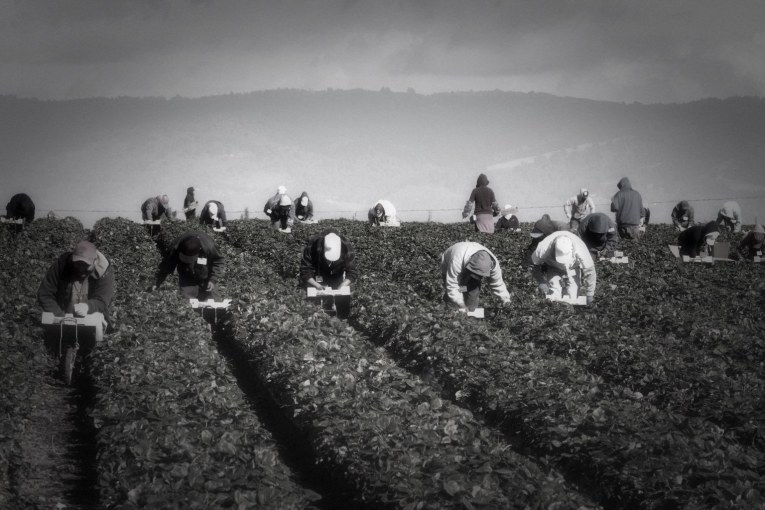

On Monday Governor Jerry Brown signed AB 1066 with little fanfare – a spokesperson told the media, “We are letting the signature speak for itself.” The bill, written by San Diego Assemblywoman Lorena Gonzalez, calls for new overtime rules for farmworkers to be phased in over a four-year period beginning in 2019.
Currently, the state has a 10-hour day for workers before they earn overtime. Under 1066, it would lower the threshold by half an hour each year until it reaches the standard eight-hour day by 2022. In addition, it will phase in a 40-hour work week for farmworkers, for the first time ever.
There is a provision that would enable the governor to suspend any part of the process for a year, depending on economic conditions.
“AB 1066 will extend equitable overtime standards to farmworkers for the first time in history,” a press release for the California Labor Federation stated. “Farmworkers were first excluded from the 1938 Fair Labor Standards Act, which set standards for minimum wage, child labor laws, overtime pay and more.”
Forty years ago, Governor Brown, in his first tour as governor, signed into law a modified standard for farmworkers: a 10-hour workday and a 60-hour work week. “Forty years later, Governor Brown heard the voices of working people standing together to fight for overtime equality and signed AB 1066, which will gradually phase in the standards we all know and love to farmworkers: an 8 hour day and 40 hour workweek,” the release stated.
Assemblymember Gonzales stated, “This is a truly historic day in California. Thanks to an incredible coalition of workers, lawmakers, labor, environmentalists and individually committed Californians, we have finally righted a 78-year wrong for farmworkers,” said Gonzalez. “The hundreds of thousands of men and women who work in California’s fields, dairies and ranches feed the world and anchor our economy. They will finally be treated equally under the law. It is a good day.”
US Labor Secretary Tom Perez also applauded the new standards: “People who work on farms and in our homes are some of America’s most vulnerable workers. We all depend on their work to feed and care for our families, but far too often they can’t afford to put food on their own dinner tables. Today, Gov. Jerry Brown signed two new laws to ensure critical overtime protections for these workers. With these laws, California farmworkers will have the same overtime protections that workers in other industries have enjoyed for decades, and overtime protections for domestic workers implemented in 2013 will continue. I commend Gov. Brown for ensuring strong, sensible safeguards for farmworkers and their families, and I commend the California legislature for their ongoing efforts to protect the most vulnerable workers in their state.”
“The whole world eats the food provided by California farmworkers, yet we don’t guarantee fair overtime pay for the backbreaking manual labor they put in to keep us fed,” said Assemblymember Gonzalez in late August. “We know this is the right thing to do, and thanks to the hard work of an incredible coalition throughout the state and across the country, we’re now one step closer to finally providing our hard-working farmworkers the dignity they deserve.”
In March, the importance of legislation to normalize overtime rules for California farmworkers received strong backing in a letter from former Secretary of State Hillary Clinton, who said that “it reflects our shared commitment to fair and humane working conditions for those whose labor feed our nation and much of the world.”
In 2014, California’s farms and ranches brought in $54 billion in revenue. More than 90 percent of California farmworkers are Latino and more than 80 percent are immigrants. Recent data also found the median personal income of California farmworkers to be just $14,000.
UFW (United Farm Workers), which was a sponsor of the bill, believes it will address an injustice first inflicted on farmworkers nearly eight decades ago. “In 1938, Congress passed the Fair Labor Standards Act (FLSA), which established the minimum wage, recordkeeping, child labor standards, and overtime pay eligibility. Unfortunately, the FLSA failed to include agricultural workers throughout the United States. However, as with all provisions of the FLSA, states are allowed to exceed the requirements laid out in the FLSA.”
UFW President Arturo S. Rodriguez applauded Governor Brown, “making a tough decision like this and changing the course of history.”
AB 1066 “would give license to farmworkers in other states fighting for the same thing,” Mr. Rodriguez stated. “I’m crying tears of joy after so many years that farmworkers have worked so hard to win a significant victory like this that will dramatically change their lives.”
—David M. Greenwald reporting

It will be interesting to see what the results are. I am skeptical that this is a good idea but maybe it will be OK.